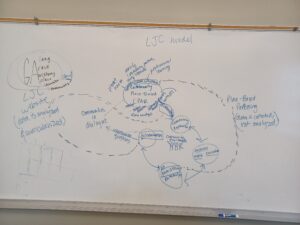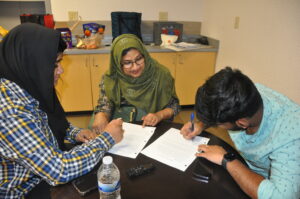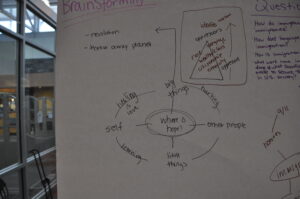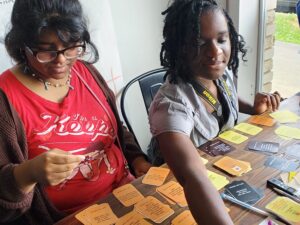Where We’re Rooted
Theoretical Framework
Language
We believe languages, language varieties, and community literacies are developed over time in social and cultural communities. Language is tied to identity, history, and place. Language is how we construct selves and communities and how others construct understandings about us through linguistic ideologies.
Race
We believe language and literacies construct self and community. These identities are a part of the systems of power, privilege, and ideologies that shape the way language is used, heard, and understood. We foreground “race” rather than “identity” to ensure the racialization of language is explicit in our understandings of language and literacies.
History
We believe language and literacies are ever evolving over time. Understanding languages’ and literacy practices’ power in (re)constructing self and community is intertwined with long histories. We understand studying language and community literacies means studying the past, present, and potential futures of self and community becoming.
Place
We believe language is used in geographic spaces whose histories have shaped and reshaped language, literacy practices, and conceptions of justice. We believe language and literacy practices are place-based: they hold the most meaning and potential for the space in which they are developed and used.
Identities
We believe as we grow in understanding our languages, races, histories, and places in the world, our identities are also developed, changed, and sustained. This is represented by the individual dots growing and coming together.
Communities
We believe that as individual identities are developed, changed, and sustained, they come together to form unique communities throughout Georgia. These communities are sustained through community language and literacy practices. This is represented by the individual dots becoming an orange circle.
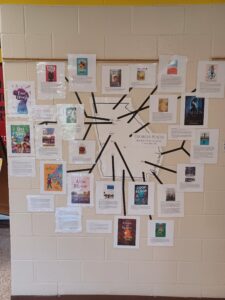
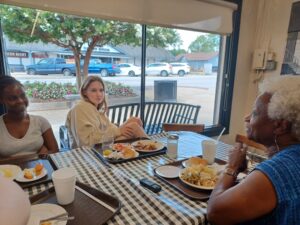

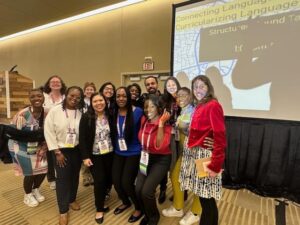
Here are a few of the seminal articles and books the Linguistic Justice Collaborative have studied and discussed to create our theoretical framework:
Baker-Bell, A. (2020). Linguistic justice: Black language, literacy, identity, and pedagogy. Routledge.
Caraballo, L., Lozenski, B. D., Lyiscott, J. J., & Morrell, E. (2017). YPAR and critical epistemologies: Rethinking education research. Review of Research in Education, 41(1), 311-336.
Flores, N., & Rosa, J. (2015). Undoing appropriateness: Raciolinguistic ideologies and language diversity in education. Harvard Educational Review, 85(2), 149
Hudley, A. H. C., Mallinson, C., & Bucholtz, M. (2020). Toward racial justice in linguistics: Interdisciplinary insights into theorizing race in the discipline and diversifying the profession. Language, 96(4), e200-e235.
Paris, D., & Alim, H. S. (Eds.). (2017). Culturally sustaining pedagogies: Teaching and learning for justice in a changing world. Teachers College Press.
Paris, D., & Alim, H. S. (Eds.). (2017). Culturally sustaining pedagogies: Teaching and learning for justice in a changing world. Teachers College Press.
Sánchez, L., & Honeyford, M. (2021). Creating critically engaged classrooms through community literacies. Journal of Adolescent & Adult Literacy, 9-15.
Tuck, E. (2009). Suspending damage: A letter to communities. Harvard Educational Review, 79(3), 409-428.
And many, many more. Here is an ever evolving reading and listening list that our collaborators recommend with examples on how we translate them into teaching resources: Language and Linguistic Justice Resources
Spreading Roots
Theory of Change
This work asks for change. We believe change happens in humanizing, intimate, empathetic dialogue that leads to action. Having a theory of change empowers each collaborator in the LJC make in the moment decisions
Humanizing
We believe change happens within humanizing relationships where each individual is seen as a whole person with a history and unique experiences worthy of personal engagement. Therefore, we seek dialogue with all persons, groups, or organizations.
Intimate
We believe change happens within civil, intimate, and vulnerable relationships. Therefore, we intentionally prioritize small events, programs, workshops, conferences, and meetings to ensure there is space for listening, asking questions, admitting misconceptions, and unpacking assumptions. We also prioritize authentic, community-based settings to complete our programs, projects, and work such as public libraries, parks, and locally owned coffee shops–except where these spaces would create inaccessibility for our collaborators.
Empathic
We believe change happens within civil, intimate, and vulnerable relationships. Making ideological and behavioral changes is not just a logical endeavor, but an affective one. Therefore we seek to reduce fear and enter into vulnerable relationships through storytelling that demonstrates how our own understandings of language, race, history, and place have been challenged and ultimately changed our identities and communities.
Dialogue
We believe change happens within dialogic interaction. We prioritize asking questions and collaboratively exploring new information, perspectives, research, and experiences. We prioritize intergenerational dialogue that includes and centers youth. While we prefer multilingual and intercultural dialogue, we understand this is not always safe nor possible in all situations.
TO Action
We believe change includes shifts in thinking, but also must include intentional action. Therefore, we do not end with dialogue but offer and collaboratively develop resources, sustained support, and clear action steps based on individual positionalities.
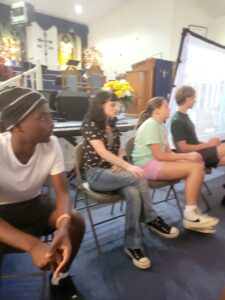
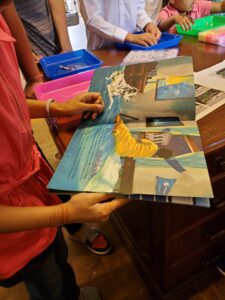
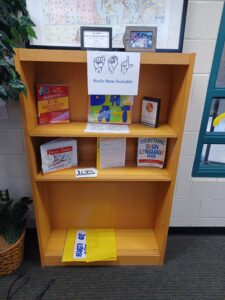
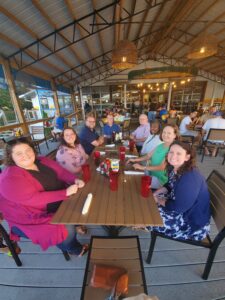
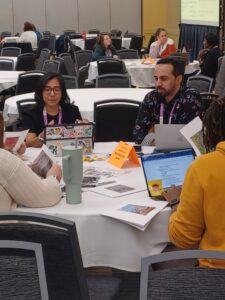
Research Design
All projects begin by being in dialogue with community members. Key designs and frameworks we use include participatory action research, place-based and community embedded data collection, and dialogic data analysis but continually evolve based on the innovations of our youth and community researchers. Aligned with our theory of change, all of our research projects results in action: open access curriculum, resources, community education events, archives, and more!
